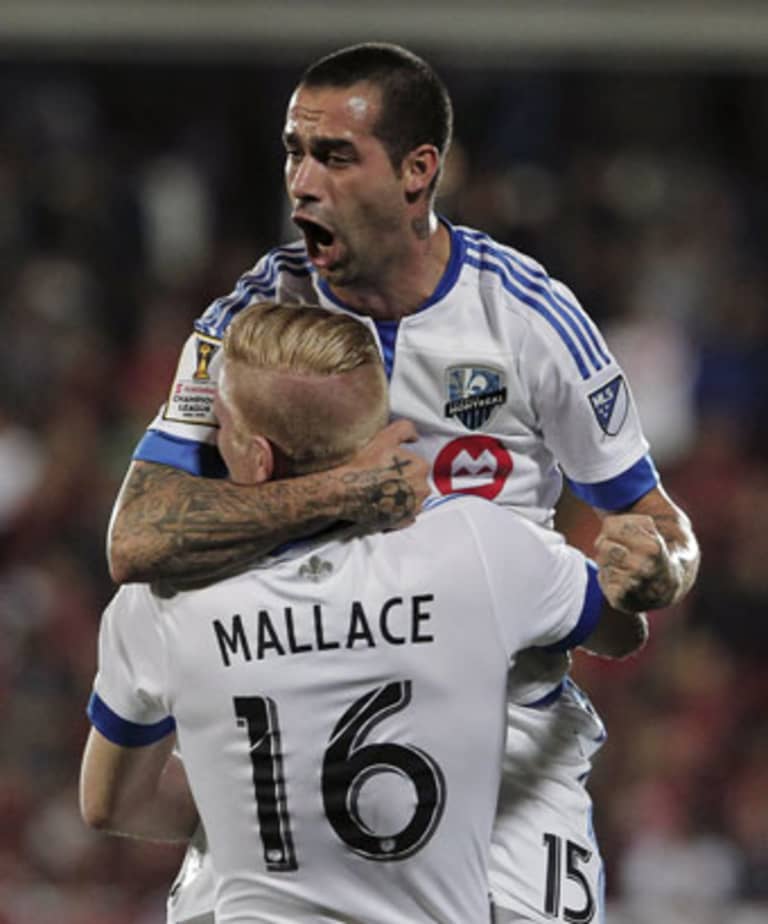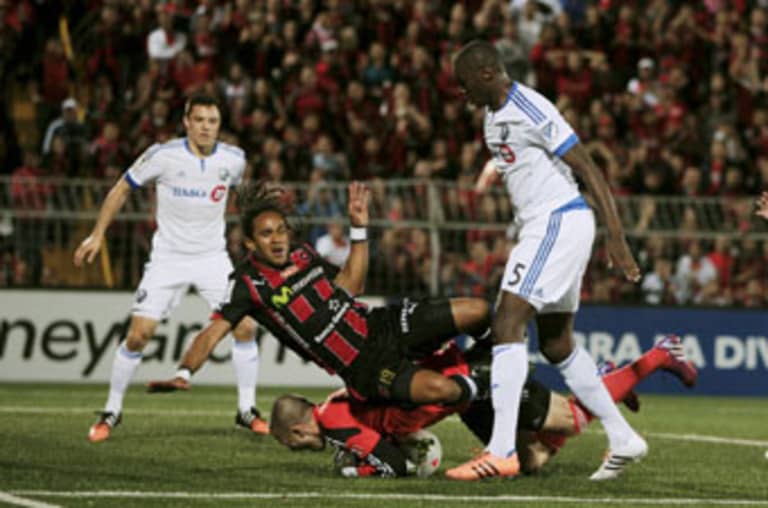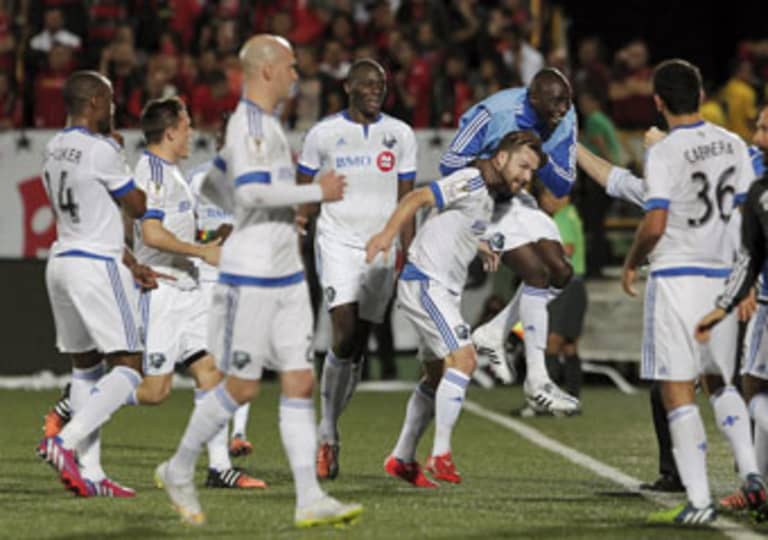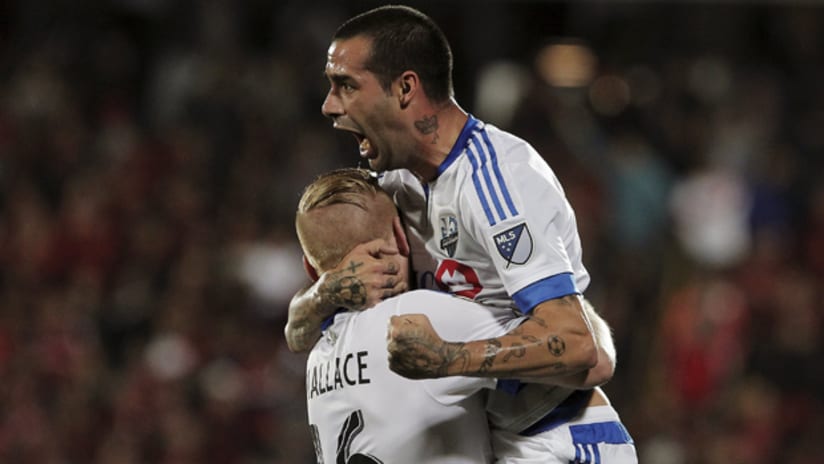That was dirty, loud, humid, sweaty, violent, ugly and a little gross.
But damn if it wasn’t beautiful, too.
The Montreal Impact – the same club that finished with the worst record in MLS not even six months ago – advanced to the CONCACAF Champions League final on Tuesday night by barely, just barely hanging on in the second leg of their semifinal series to top Costa Rica’s Alajuelense on away goals after tying 4-4 on aggregate.
The Impact seemed to have things under wraps on two different occasions.
Jack McInerney
’s first-half strike to put Montreal up 3-0 on aggregate, with an away goal to boot, should’ve been enough.

It wasn’t.
After Alajuelense made it a contest again with two goals early in the second half, Andres Romero’s 72nd-minute finish to put the Impact up 4-2 really should’ve ended things.
It didn’t.
We shouldn’t have been surprised. After all, this is CONCACAF, soccer’s unrelentingly absurd confederation. And this is the CCL, its willfully insane club competition.
Nothing is ever easy here, and no lead is ever secure.
So, as it’s done so many times through the years, CONCACAF’s flagship club tournament reared its twisted, tormented, monstrous head time and time again on Tuesday.
The Alajuelense crowd was incessantly intimidating, clad in its red and black, heaving, sweating, screaming and throwing shoes (?!?) in the steeply pitched stands of Estadio Alejandro Morera Soto. The pace of the game was breakneck, with the hosts constantly racing up and down their quick turf surface, always in search of another goal. The fouls came in hard and fast, both sides violently crushing the other with their tackles, the referee swallowing his whistle for many of them.
It was peak CONCACAF, and it almost did the Impact in.
Needing three goals to advance after Romero’s strike put the Impact up by two, Alajuelense nearly came all the way back, scoring in the 79th and 93rd minutes to inch within one goal of the final.
Five more minutes, and Montreal may have capitulated. But, somehow, the Impact held on, gutting it out until the final whistle to become the first Canadian team and just the second MLS club to qualify for the CONCACAF Champions League final.

It was an exhausting effort, one born out of months of preparation, roster building and investment. The Impact – who traveled to Mexico a full two weeks before their quarterfinal first leg at Pachuca – have taken this tournament seriously, and they’ve been rewarded.
Their ride to the final has been incredible. After drawing Pachuca 2-2 in Mexico in the quarterfinal first leg, all the Impact needed was a low-scoring tie in Montreal in the second leg to advance to the semis. Things were scoreless and under control until the 80th minute, when Laurent Ciman – a Belgian international and the club’s biggest offseason signing – was whistled for a PK. Pachuca converted, and it looked like the Impact’s international adventure would come to an end.
Then, Cameron Porterblew the roof off the Big O. The rookie out of Princeton, unknown to most MLS clubs less than two months prior, scored a wonderfully improbable goal at the death to sink Pachuca and send the Impact into the semis.
They took care of business in the first leg, beating Alajuelense 2-0 at Olympic Stadium on March 18. We all knew Tuesday night’s second leg would be at least a little bit dicey, and it certainly lived up to those expectations, with the Impact only able to exhale after the final whistle sounded four and a half minutes into second-half stoppage time.
Now, they’ve made history, joining Real Salt Lake as one of just two MLS clubs to qualify for the CCL final. There, they’ll face either Mexico’s Club America – possibly the biggest club on the continent – or Costa Rica’s Herediano, who are only in the tournament because Belize’s qualifier, the Belmopan Bandits,
had their field deemed unplayable by CONCACAF
.

Herediano is in control heading into Wednesday’s second leg after knocking off America 3-0 in Costa Rica three weeks ago in a game marred by an America player’s horrific kick to the head of a prone Herediano opponent. Still, there are no guarantees the Costa Rican side will go through, not against a big-time club like America, and definitely not against one who calls the altitude, smog and heat of the Azteca home.
Regardless of who they face, the Impact will undoubtedly be underdogs. With their focus firmly on the CCL, Montreal have struggled to start the MLS season, posting a 0-1-2 record through their first three league matches. This isn’t the team we’ve pictured lifting MLS’s first CCL trophy. Montreal’s roster has holes; they're inexperienced in places and injured in others.
But the Impact know who they are, and they know how they want to play. They’ve got some big guns in Ciman and Designated Player Ignacio Piatti, and they have talented players who fit their counterattacking system in McInerney, Dominic Oduro and Dilly Duka.
They’re far from perfect, but then, CONCACAF and the CCL don’t exactly deserve a perfect champion. The Impact, with all their flaws, all their passion and all their drama, would be an imperfect winner of an imperfect confederation’s imperfect competition.
A Montreal championship would be unlikely, confusing and a little ugly.
But damn if it wouldn’t be beautiful, too.







